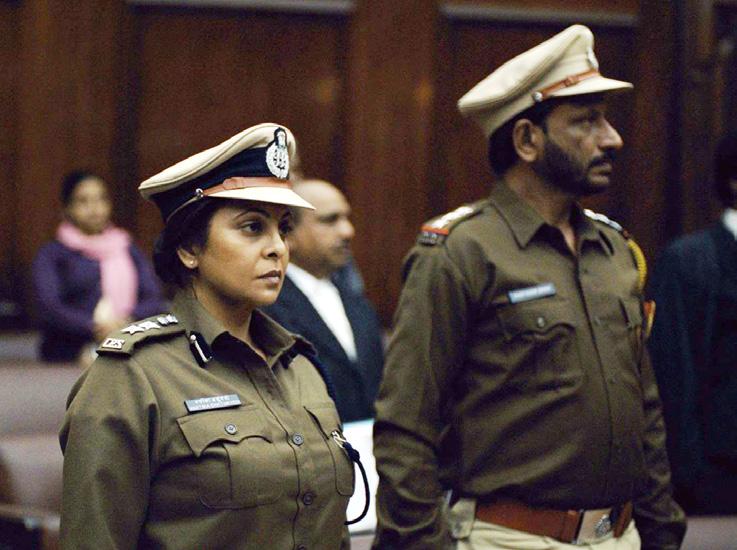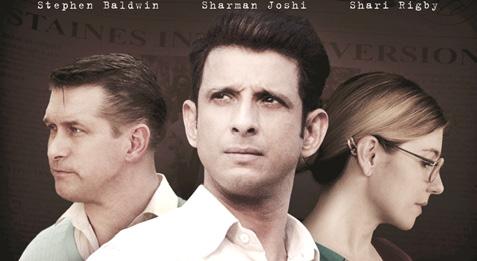
4 minute read
UNPALATABLE TRUTHS
from 2019-04 Sydney (1)
by Indian Link
some of the real-life crime dramas on television (some of which are not bad at all) mainly for the level of performance director Mehta gets out of the cast especially Shefali Shah.
But it doesn't achieve that level of emotional impact that I expected from the product considering the fine talent that's gone into it.
There are two reasons why Delhi Crime stops short of being a masterpiece on real-life crime. For one, it holds back way too much of the angst probably to appeal to a global audience. The attempt to subdue the sheer insanity of the crime is admirable but eventually a fatal error of judgment.

DELHI CRIME (Netflix)
STARRING: Shefali Shah, Rasika Dugal
DIRECTOR: Richie Mehta
HHHH
It isn't easy being on the right side of the law when all you get for your efforts is brickbats and insults from fence sitters.
To say that this disturbing but finally redundant real-life crime drama whitewashes the khaki uniform, would be frivolous and irresponsible to the extreme. What it does do, is to humanise the police force by showing a cluster of fiercely committed police officers (women, in this story) driving themselves over the edge to nap the perpetrators of the crime.
Did the cops on the case really show this level of commitment? Does it matter? Heroism on a level where it heals society is unquestionable.
Recreating in vivid vicious colours the events before, during and after the life-changing ‘Nirbhaya’ gang rape in Delhi, this seven-part series spares us the brutality of watching the rape but protects from none of the trauma and horrific aftermath of a crime that shook the conscience of the nation.
As we hear our drama's hero Vartika Chaturvedi say, this crime was different, the savagery was unprecedented. She got it right.
I will never forget the sequence where the ravaged girl is rolled into the hospital bloodied, brutalised beyond all human explanation, in pain beyond all endurance, and yet tells her father, "I will be fine".
We do that all the time. We keep saying things will be fine when we know they will only get worse.
Director Richie Mehta negotiates with powerful hands the many hurdles that a crime investigation so complex must face. This is a very professionally handled crime drama, superior to
A more immediate crisis of efficacy emerges from the fact that Delhi Crime resembles a very recent Netflix film Soni which was in every way a superior work. The domestic disarray in the life of the female cops and the professional dynamics between two female officers in Soni is echoed here in the rapport that grows between the two cops played by Shefali Shah and Rasika Dugal, both in fine form, imbuing the contours of crime with an implosive reined-in anger at a system that fosters inequality and brutality.
Shefali Shah is especially powerful. She is compelling because her anger is internalised, palpable. She not only anchors the series with her persuasive presence, she also diminishes and decimates the rather disturbing feeling we get that this sort of stark recreation of India's most well-known sex crime serves no purpose except to remind us that the change we hoped to see in the number of rapes in our country, never happened.
Nirbhaya lives, and dies, again. Long live Nirbhaya.

Subhash K. Jha
Notebook
STARRING: Pranutan Behl, Zaheer Iqbal
DIRECTOR: Nitin Kakkar
HHH
It is significant that Salman Khan is a producer on this tender most lyrical
The Least Of These
STARRING: Sharman Joshi, Stephen Baldwin

DIRECTOR: Aneesh Daniels
HHH
From the outset of this profoundly moving though flawed recreation of the ghastly Graham Staines murder, director Aneesh Daniels and writer Andrew Matthews, make it very clear to us whose side they are on.
And that's perfectly fine by me.
A work of art is most welcome to take sides if it knows the truth. And truth in this case was this: Odishabased Australian missionary Graham Staines did not indulge in conversion of the locals. He was cleared of all malafide intentions by an investigative committee after he and his two little sons were burnt to death by goons with suspicious political affiliation. Nobody is suggesting saffron in the blood. This has gone far beyond mere suggestion.
It is interesting how the director has chosen Sharman Joshi's character of the out-of-luck desperate journalist with a pregnant wife to support, to create an arc from cynicism about Staines' work of faith to a resounding love story of his career. Salman has repeatedly expressed his aversion to physical love on screen, PDA at its most public if you please. He doesn't ever kiss his heroines.
Neither does his new discovery Zaheer Iqbal, young debutant.
This is a romance where the lead pair doesn't meet. They touch each other's lives through words. Not poetry, mind you. This is not an occasion to do a Pakeezaah on us.
Director Nitin Kakkar whose last film Mitron is a neglected gem, creates a stirring alchemy in the romance. The mood is as sombre as the Valley when the guns are silent.
This is a love story that dares to be pure. And sublime. It defines the concept of echo-walking, where one protagonist walks on the footprints left behind by another, bringing together the two polarised protagonists in ways that they themselves wouldn't comprehend.
Hence there is Kabir and Firdaus who are in love with the idea of being in love with one another.
(Kabir takes up a new job as a teacher in a remote village, and happens upon the diary of his predecessor, Firdaus. As he begins falling in love, the roles are reversed, and she is back in her old job. Now she finds his scribblings in her old diary….)
Kakkar and his writer Darab Farooqui keep it simple all the way, On the surface the narrative courts tranquility with negative earnestness. It refuses to submerge its consciousness in the political issues of Kashmir, knowing fully well that it can't escape the reality of violence. But then there is always that escape route where the artiste can con himself into believing love conquers all. Notebook takes the quiet gentle route.
That it actually makes us invest in its belief, that it avoids making us









